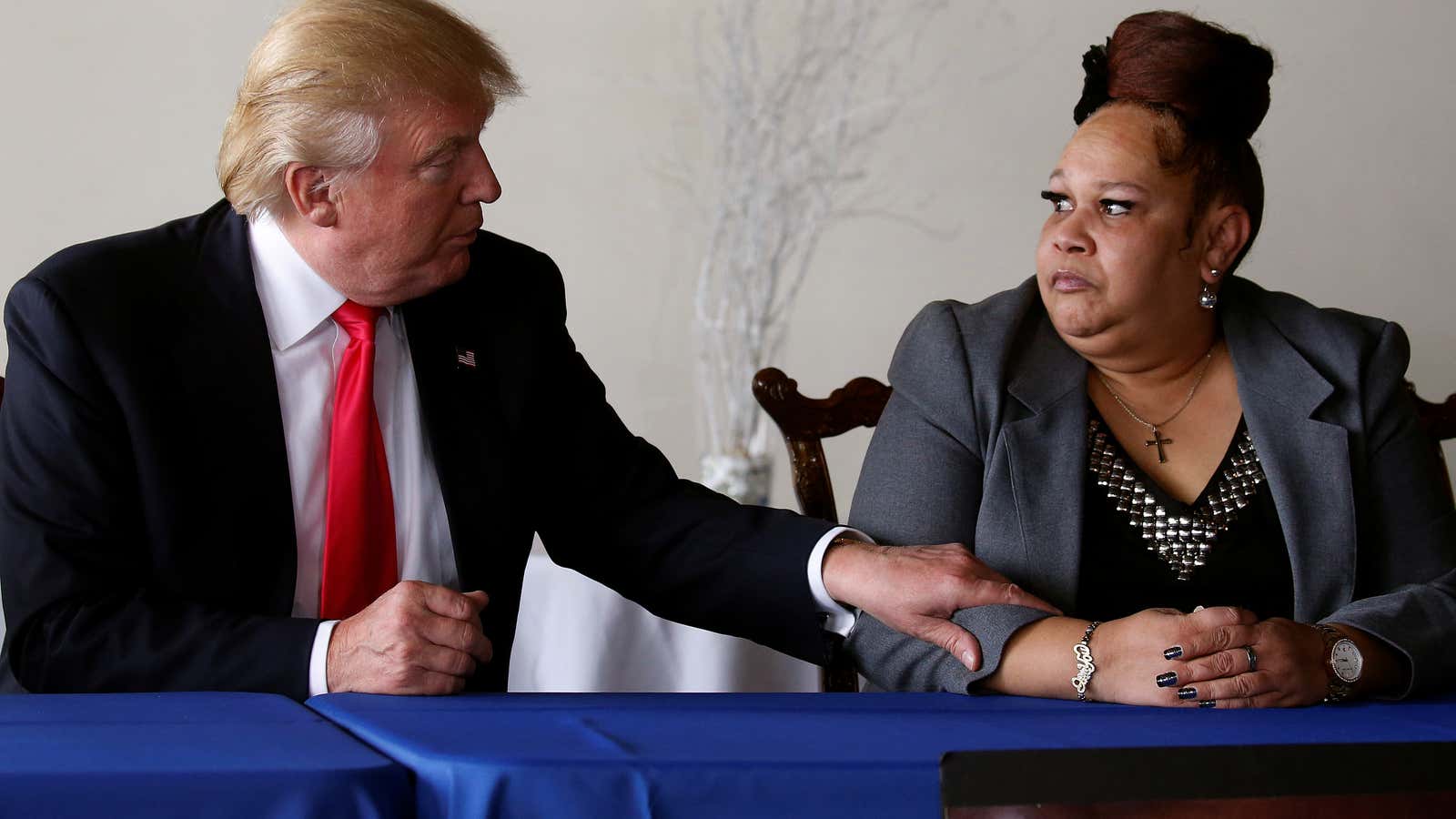“I have great respect for women,” notorious braggart and accused rapist Donald Trump said in the opening minutes of the second presidential debate. “Nobody has more respect for women than I do.”
The lie is laughable in its audacity—like a little child with chocolate residue smeared all over his face who then claims he didn’t eat the food. But even more disturbingly, the lie points to Trump’s political strategy—which depends very much on using women as props, publicly objectifying them and denigrating them for his own advantage.
For the better part of 2016, Trump has consistently and unrepentantly lied about the indecorous, unethical, and downright bigoted statements he’s made throughout his adult public life. He referred to his boasts about sexual assault to be “just words” and mere “locker room talk” during the debate. Such behavior, also known as gaslighting, is a common form of psychological projection employed by narcissists like Trump to avoid being held accountable for their actions.
If polls are to be believed, many voters aren’t buying Trump’s excuses anymore. Women especially are making their disapproval known. But it’s important to note that Trump’s gaslighting strategy isn’t just insulting to the average American vote: it’s inherently misogynistic.
Take the candidate’s pre-debate circus show. His strategy took a potentially unprecedented turn in presidential politics when he held a press conference less than two hours before the debate with three of Bill Clinton’s accusers, and a fourth woman whose rapist Hillary Clinton was assigned to defend as a court-appointed public attorney in 1975. It was tactical diversion: distract people from his own ugly scandal by bringing up even older news about the spouse of his political opponent.
These four women had a use value to Trump. He doesn’t care about or respect them: if he did, he wouldn’t have previously called Paula Jones “a loser,” or felt the need to slander their physical appearance. “The whole group—Paula Jones, Lewinsky—it’s just a really unattractive group,” he said in a 1998 Fox News segment. Later, during that same segment, he refers to Bill Clinton as a “victim.”
Despite his repeated statements to the contrary, Trump doesn’t respect women. He just likes them when he can use them—sexually or otherwise—to increase his power and social stature. He uses women like Kellyanne Conway as a deceptive, feminine talking head to explain away his ceaseless bigotry, racism, and sexism. In fact, his entire coterie of female media representatives—from Omarosa to Scottie Neil Hughes and Hope Hicks—are designed to prove that he respects women. And yet, by surrounding himself with pretty and often very young women, he shows his hand—for Trump, this is still all about the performance of power and sexual dominance. This is also why all his female employees must be “attractive.”
This isn’t speculation. Trump himself has talked about how he values his wives as trophies. As Jill Filipovic wrote at the New York Times, they are objects to be collected and displayed. His wives are also permitted to gift Trump with little miniature versions of himself—which they are then expected to single-handedly take care of and raise. In a 1994 ABC Primetime Live interview, he also candidly compared his wives to his buildings. “It’s like a creation process,” he said, explaining how he has helped his wives become celebrities in their own right. “It’s almost like creating a building. It’s pretty sad.”
Unfortunately, after his wives become stars in their own right, their independent success ruins their value. He continued, “I love creating stars. And to a certain extent, I’ve done that with Ivana. To a certain extent, I’ve done that with Marla. And I like that … Unfortunately, after they’re a star, the fun is over for me.”
This same strategy also crops up in his employment of his daughters, most notably Ivanka, whom he agreed was a “piece of ass” and has had perform the role of pseudo-feminist in his campaign. Yet while Ivanka may regurgitate feminist sound bites, Trump’s dominance and sexual possessiveness over his daughter undermines any message of female empowerment. “You know who is one of the great beauties of the world, and I helped create her? Ivanka,” he told Howard Stern in 2003. “My daughter, Ivanka.”
When Trump calls women “pigs” or Clinton “the devil,” his misogyny is hard to miss. But beyond the name-calling and the insults, his exploitation (and under-compensation) of women as things and his feigning interest or compassion in their lives in order to increase his own power or social standing constitutes a pattern that spans decades, perhaps dating all the way back to high school when his senior yearbook photo was captioned “Ladies’ Man.” Using women with such bravado—with such authoritative righteousness—is the antithesis of ethical behavior. And it epitomizes everything wrong with American masculinity.
